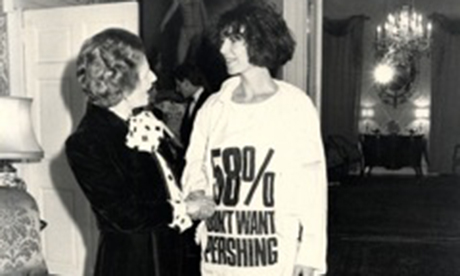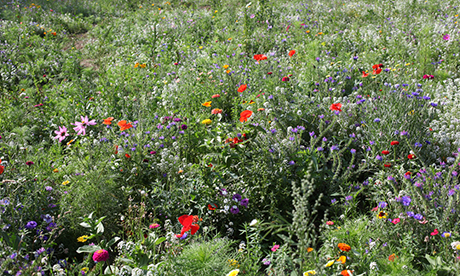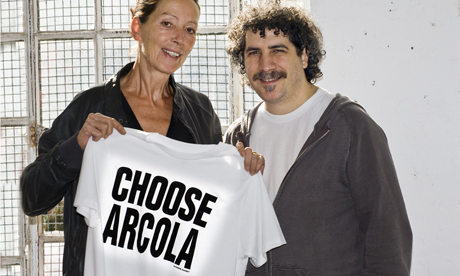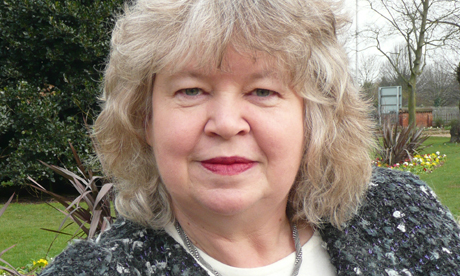Katharine Hamnett CBE slams council use of weedkiller on London Fields wildflower meadow
Important note: a meeting relating to the campaign outlined in this story was originally due to take place this Saturday at Pub on the Park. The venue and time have now changed, and the meeting will now take place at St Michael and All Angels London Fields Church Hall, Lansdowne Drive, E8, from 1pm-2pm this Saturday (17 May).
A famous fashion designer has voiced outrage at Hackney Council’s enthusiastic use of a controversial pesticide that environmentalists blame for health problems.
Katharine Hamnett CBE, who lives near Hackney Central, is infuriated that park keepers have allegedly been seen sprinkling the wildflower meadow in London Fields with potentially harmful weed killer glyphosate over the past two weeks.
Some tests on animals have suggested a link between glyphosate and infertility, though industry bodies insist there is no evidence harmful effects are caused by the weed killer, which has been in use since the 1970s and is marketed as ‘Roundup’ by biotech giant Monsanto.
But Ms Hamnett, who was made a CBE in 2010 for services to the fashion industry, is so concerned about the chemical, which she describes as a “poison”, that she has been handing out flyers in London Fields warning people not to walk or picnic within 100 feet of the wildflower meadow.
The flyer states: “Spray can drift from the area being sprayed 60ft upwards. It would be advisable for everyone to give the area surrounding the wildflower meadow a wide berth.
“Sitting on the grass, eating with your hands near an area that has been sprayed with herbicide is the shortest route to ingesting it bar drinking it straight from the bottle.”

Longstanding campaigner: Katharine Hamnett meeting then Prime Minister Margaret Thatcher in 1984, when she hijacked a Downing Street reception for fashion designers to make an anti-nuclear statement
‘Unnecessary’
Hackney Council spends £40,000 each year on dousing our streets with glyphosate.
Research by Friends of the Earth concluded the chemical has entered the food chain and water system and is widely present in the urine of Londoners.
Ms Hamnett has called for workers for the council’s contractor WeedFree to be given masks as a precaution.
She said: “The people who are spraying it are not wearing any kind of protective masks. I’m really concerned for their welfare as they are getting huge doses.”
The irony of using a commercial weed killer to grow a wildflower meadow has not been lost on opponents of glyphosate.
Spraying the meadow with the chemical was “completely unnecessary”, Ms Hamnett said, adding: “All you need to do to lay the meadow is to plough.”

Too pretty to be a biohazard: The London Fields wildflower meadow in bloom last year. It is currently being re-seeded, and council workers have allegedly been spraying it with glyphosate to remove weeds. Photograph: Hackney Council
Campaign
Environmental campaigner Caroline Day of group Save Lea Marshes said glyphosate is being “indiscriminately used” in areas of the Lee Valley Regional Park that are listed as Sites of Special Scientific Interest because of their value for nature conservation.
She said: “It is being used in parks, on estates, in agriculture and by Network Rail to keep the railway lines free of weeds, so our exposure to it is now really enormous. Evidence suggests our health is being put at risk as a result. This is an absolutely crucial issue and I am delighted that Katharine Hamnett is taking this stance and organising a campaign.”
Campaigners against glyphosate are holding a public meeting this Saturday when they will call on the council to ban the chemical.
Green Party politician Jean Lambert, who will speak at the event, said it highlighted “growing concern” about the use of glyphosate in London Fields, adding: “As summer looms, and we can expect to see the return of hundreds of young picnickers sitting on the grass near sprayed areas, the issue is one of increasing importance.
“Next year the European Parliament will review the legality of current uses of ‘Roundup’ and will examine the health impacts of its use in parks and built-up areas. I will argue that it should not be used in parks. I look forward to meeting many local park users at the meeting: please come along!”
Some ecologists fear glyphosate may be harmful to amphibians and could be linked to a sharp decline in bee numbers, though respected Hackney entomologist Russell Miller says he has seen no evidence proving this.
Hackney Council did not respond to an emailed request for comment, but the Town Hall has previously said it uses glyphosate because it is more expensive to remove weeds by hand, adding there is no evidence using glyphosate to target weeds presents dangers to the environment or human health.
Update at 3.57pm on Tuesday 13 May:
Syd Bolton, who lives near London Fields, is in the process examining paperwork from the council to check whether its use of glyphosate is in keeping with guidance stating local authorities’ use of pesticides must be “proportionate” and that other ways of removing weeds should be considered.
Mr Bolton, who said this guidance amounted to a ‘no spraying unless you have to’ stance, said: “Hackney Council’s policy in how it implements the use of pesticides in public areas is unclear. Whether or not this particular product is injurious to public health, the rules that exist – national-level guidance that has been endorsed – call for particularly careful arrangements around the spraying of pesticides in public areas which are very detailed.”
Campaigners hope to challenge the council if it is found it did not follow best practice around the use of pesticides in parks.
Update at 4.14pm on Tuesday 13 May:
Kim Wright, Corporate Director for Health and Community Services at Hackney Council, said: “This product has been declared safe and environmentally friendly by government and it is used by councils across the country for weed control as well as being widely on sale to the public.”
The council said its gardening staff use glyphosate in the form of Roundup Pro Biactive to control weeds on paths and shrub beds, and in the case of the meadow in order to control the “dominant local, more aggressive weeds that colonised the area”.
A council spokesperson said that if these weeds were not removed it would reduce the chance of colourful flowers growing and added that the Royal Horticultural Society recommends the use of glyphosate for the maintenance of wildflower meadows.
Related:
Hackney Council criticised for spending £40,000 to spray pavements with glyphosate



And it continues, Leicester City Council buys enough Roundup to spray 5 sq kilometers of the city centre every year. No one will explain why they use it.
It seems that ease of maintenance takes precedence over the environment.
They send out their workers in biohazard suits as they spray pavements outside schools and play areas. They use so much of it around trees that the soil is being eroded away and the roots of the trees exposed.
A bee keeper of 50 years and his observations http://www.motherearthnews.com/homesteading-and-livestock/roundup-bees-zm0z10zarc.aspx#axzz31GYzOTUA
I have been walking my dog in London Fields for the past 13 years and he is now receiving chemotherapy treatment for lymph cancer costing £6,000. I’m sure Hackney Council will sit up and listen when the claims start coming in, not just from dogs-owners, but from humans too. It would be cheaper in the long term to pull out weeds by hand than to use Roundup!
For the last 7 years I’ve lived and worked on a large estate that regularly sprays Round Up on paths, hard surface areas including the area around the poly tunnels where my dogs lay while I’m working. although I try and keep them away from those areas immediately after spraying, they constantly lick their paws to the point of being raw and has now had several tumours removed (from paw)My other dog has also had several tumours too, together with losing the fur from her side and belly. This year we had a trial to stop spraying round up. It’s the first year they’ve got through the summer without any problems. There are also lots more bees nesting in cracks in the wall. The gardener also sprays without a mask on so I’m more concerned for his health than anyone’s. Respect to Katherine for starting this campaign. It’s imperative Parks, public spaces and amenity areas are chemical free. We are ingesting enough of it in the food we eat already. New research shows round up is present in breast milk and urine.
I am a parish councillor for my village of Millbrook (Cornwall). The parish council approves of the use of Roundup for weed control in public spaces. I have tried to make them aware of the dangers but so far without success. The chairman of the parish council considers my suggestions and actions in this matter to show the council in a bad light.I put a notice in a shop window warning the villagers of the dangers of Roundup. The parish council did not like it and considered it to be an anti- council gesture. The villagers support me.
I shall maintain my efforts.
Robert Vincent.